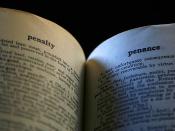If one could find a word in the English language to be more strangely and oddly used than bitch, please let me know as soon as possible. Encompassing meanings that date back from the year 1000 A.D., it has been used to describe totally unrelated things. How did society manage to distort and skew the meaning of a word to change from referring to an animal to demeaning a person?
It is not very common nowadays to hear someone refer to his cute little female pet as a bitch. However, this was the original meaning for it. Bitch, which comes in many different forms (bicce, bicge, bicche, bycche, biche, bych, begch, bytch, bich, bikkja) has no known origin. Following the first millennium, farmers and breeders had coined the term to describe all sorts of species including foxes and wolves (1598 Shaks. Merry W. iii. v. 11 A blinde bitches Puppies, fifteene i'th litter).
Although the term seemed extremely harmless and neutral since the early times, bitch had suddenly been used as a term of scorn and contempt geared towards people. Dating back to the year 1400 A.D. (Chester Pl. Whom calleste thou queine, skabde biche?), people decided to extend the meaning of a subservient animal into any sort of subservient creature- including a woman. The funny thing is the antithesis meaning of the word came into existence during the 1960s. Following the second wave feminist movement, when women were mainly concerned with independence and greater political rights, bitch came to mean strong willed and determined. If insulting women were not enough, men were also added to the list of references by 1500 A.D. (E.E. Misc. He is a schrewed byche, In fayth, I trow, he be a wyche). Bitch allows you to dehumanize a person and make them inferior to...


